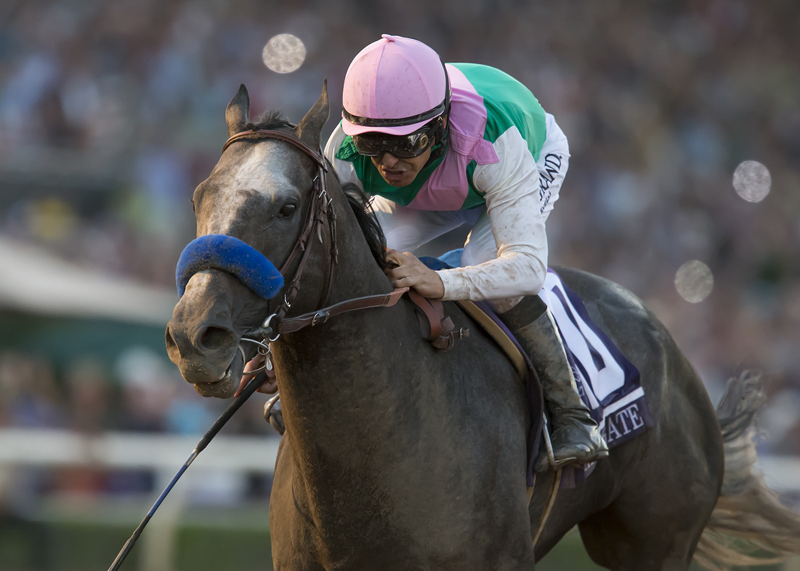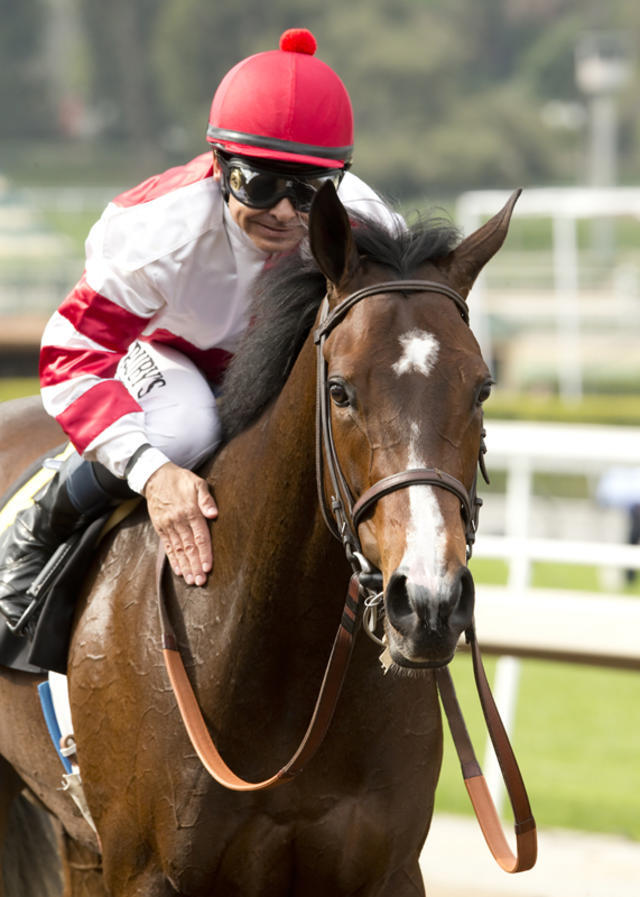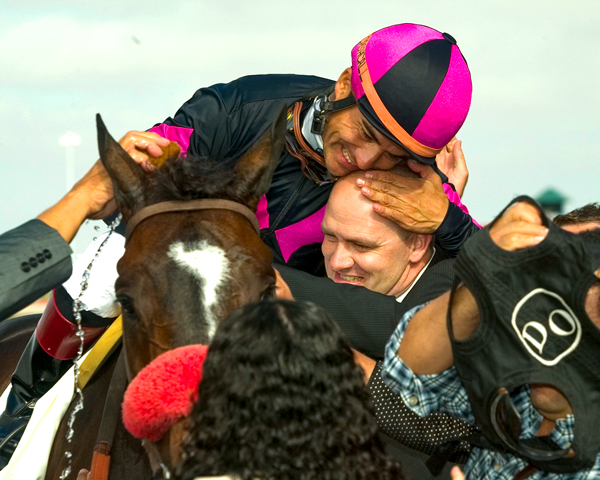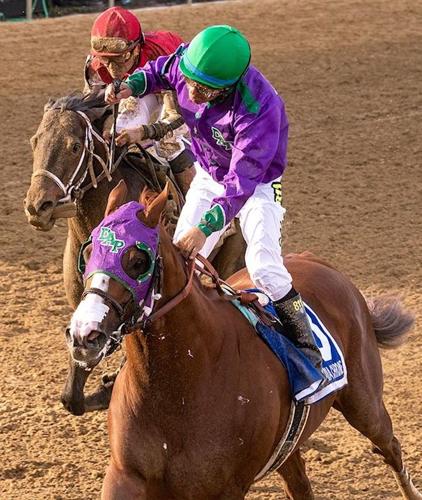
The late Arrogate defeats California Chrome in the 2016 Breeders’ Cup Classic (Benoit Photo)
NMRHOF Press Release
SARATOGA SPRINGS, N.Y.— Eight new members have been elected to the National Museum of Racing and Hall of Fame. The class of 2023 is comprised of jockey Corey Nakatani and the racehorses Arrogate (KY), California Chrome (CA), and Songbird (KY) in the contemporary category; jockey Fernando Toro via the Historic Review Committee; and Pillars of the Turf selections John W. Hanes II, Leonard W. Jerome, and Stella F. Thayer. Arrogate, California Chrome, and Songbird were all elected in their first year of eligibility.
The 2023 Hall of Fame class will be enshrined on Friday, Aug. 4, at the Fasig-Tipton sales pavilion in Saratoga Springs at 10:30 a.m. The ceremony will be broadcast live on the Museum website at www.racingmuseum.org. The event is open to the public and free to attend.
Corey Nakatani, 52, a native of Covina, Calif., won 3,909 races with purse earnings of $234,554,534 in a career that spanned from 1988 through 2018. His 341 graded stakes victories included 10 Breeders’ Cup races. Nakatani ranks No. 14 all-time in career earnings and finished in the top 20 in annual earnings 16 times, including 11 times in the top 10. A winner of 10 riding titles on the Southern California circuit, Nakatani ranks in top 10 in overall wins and stakes wins at both Santa Anita and Del Mar. He won 1,033 races at Santa Anita (No. 9 all-time), including 131 stakes (No. 8), and 705 races at Del Mar (No. 6), including 104 stakes (No. 2).
Nakatani’s significant mounts included Hall of Famers Lava Man and Serena’s Song, as well as champions Shared Belief, My Miss Aurelia, and Sweet Catomine. His 10 Breeders’ Cup victories included the 1996 Distaff (Jewel Princess) and Sprint (Lit de Justice); 1997 Sprint (Elmhurst); 1999 Mile (Silic) and Sprint (Reraise); 2004 Juvenile Fillies (Sweet Catomine); 2006 Sprint (Thor’s Echo); 2011 Turf Sprint (Regally Ready) and Juvenile Fillies (My Miss Aurelia); and the 2012 Dirt Mile (Tapizar).
Grade 1 races Nakatani won multiple times include the Hollywood Derby (1990, 1993, 2013, 2015), Matriarch (1990, 1996), Hollywood Turf Cup (1990, 1998, 2010), Las Virgenes (1991, 1995, 1997, 2005), Santa Anita Oaks (1991, 1995, 1997, 2005, 2008), Kentucky Oaks (1991, 1996), Hollywood Starlet (1992, 1994, 1995, 1996), Santa Margarita Handicap (1993, 1995, 1997, 2000, 2014), Santa Maria Handicap (1994, 1995, 1997, 1998, 2000), Oak Leaf (1994, 2006), Eddie Read Handicap (1994, 1996, 2002, 2006, 2009), Ramona Handicap (1995, 1996, 1998), Caesar’s International (1995, 1996), Beverly D. (1995, 2001), Del Mar Oaks (1998, 2003, 2007, 2014), Shoemaker Mile (2000, 2006, 2010), Manhattan (2000, 2001), Santa Anita Handicap (2000, 2006, 2007), Frizette (2004, 2011), Clement L. Hirsch (2005, 2013), Hollywood Gold Cup (2006, 2007), and Kilroe Mile (2014, 2018).
Arrogate (Unbridled’s Song—Bubbler, by Distorted Humor) compiled a record of 7-1-1 from 11 starts while racing from 2016 through 2017. His earnings of $17,422,600 represent the highest total in history for a horse with at least one start in North America. Winner of the Eclipse Award for Champion 3-Year-Old Male in 2016, Arrogate was bred by Clearsky Farms and purchased for $560,000 by Juddmonte Farms at the 2014 Keeneland September Yearling Sale. Trained by Hall of Famer Bob Baffert, Arrogate finished third in his career debut in April 2016 at Los Alamitos before winning seven consecutive races, including the Travers Stakes, Breeders’ Cup Classic, Pegasus World Cup, and Dubai World Cup.
In the Travers, Arrogate broke the 37-year-old stakes and track record at Saratoga Race Course, covering the 1¼-mile distance in 1:59.36 en route to a 13½-length victory. He followed by surging past California Chrome in the final yards to win the Breeders’ Cup Classic by a half-length at Santa Anita to secure the Eclipse Award. Returning as a 4-year-old, Arrogate set a track record of 1:46.83 for 1⅛ miles in winning the Pegasus at Gulfstream Park by 4¾ lengths. He then traveled to Meydan Racecourse for the Dubai World Cup. Despite missing the break and being squeezed early, he tracked down the field and defeated 2017 Horse of the Year Gun Runner by 2¼ lengths. With the victory, Arrogate surpassed California Chrome for the all-time North American earnings record.
California Chrome (Lucky Pulpit—Love the Chase, by Not For Love) was bred and owned by Perry Martin and Steve Coburn. Taylor Made Farm later joined in the ownership, purchasing Coburn’s share. Trained by Art Sherman, California Chrome raced from 2013 to 2017 with a record of 16-4-1 from 27 starts and earnings of $14,752,650. He was voted Horse of the Year in 2014 and 2016 and earned additional Eclipse Awards for Champion 3-Year-Old Male in 2014 and Champion Older Male in 2016.
A winner of 10 graded/group stakes, California Chrome’s signature victories included the Kentucky Derby, Preakness Stakes, Santa Anita Derby, and Hollywood Derby in 2014. After injuries limited him to two starts in 2015, California Chrome won seven of eight starts in 2016, including the Dubai World Cup, Pacific Classic, Awesome Again, and San Pasqual. He won races at seven different tracks, and in 2016 surpassed Hall of Famer Curlin for the North American earnings record, which was subsequently broken by Arrogate.
Songbird (Medaglia d’Oro—Ivanavinalot, by West Acre) was bred by John Antonelli and purchased for $400,000 by Rick Porter’s Fox Hill Farm at the 2014 Fasig-Tipton Saratoga Select Yearling Sale. Trained by Hall of Famer Jerry Hollendorfer, Songbird raced from 2015 through 2017 with a record of 13-2-0 from 15 starts and earnings of $4,692,000. Winner of Eclipse Awards for Champion 2-Year-Old Filly in 2015 and Champion 3-Year-Old Filly in 2016, Songbird won a total of 12 graded stakes, including nine Grade 1 events.

As a juvenile, Songbird won the Del Mar Debutante, Chandelier, and Breeders’ Cup Juvenile Fillies — all Grade 1 races. As a 3-year-old, her victories included Grade 1s in the Coaching Club American Oaks, Alabama, and Cotillion, as well as Grade 2s in the Las Virgenes and Santa Ysabel. After 11 consecutive wins to begin her career, Songbird suffered a nose defeat to Hall of Famer Beholder in the 2016 Breeders’ Cup Distaff. She returned as a 4-year-old to win Grade 1s in the Ogden Phipps and Delaware Handicap before being retired after finishing second in the Personal Ensign.
Fernando Toro, 82, a native of Santiago, Chile, won 3,555 races with purse earnings of $56,299,765 during his North American riding career of 1966 through 1990. Toro won his first race in his native country at the age of 15 in 1956 and topped the Chilean national jockeys standings twice. Before arriving in America, Toro won three editions of the prestigious Gran Premio, as well as the 1964 Clasico St. Leger, a race in the Chilean Triple Crown series. Based in Southern California, Toro won 80 graded stakes in North America. At the time of his retirement, he ranked in the top 10 in stakes wins at Del Mar (No. 6), Hollywood Park (No. 8), and Santa Anita (tied at No. 8).
At Del Mar, he won 38 stakes, including four editions of the San Clemente (1974, 1975, 1979, 1987); consecutive runnings of the Ramona Handicap (1971, 1972); and two renewals each of the Del Mar Derby (1970, 1981), Del Mar Oaks (1970, 1978), and Escondido (1970, 1978).
At Hollywood Park, Toro won 823 races, including 83 stakes. He won the Beverly Hills Handicap five times (1977, 1978, 1983, 1984, 1986); the American (1975 both divisions, 1982, 1989) and Wilshire (1972, 1976, 1980, 1987) four times each; the Sunset (1976, 1985, 1988) and Premiere (1976, 1986, 1987) three times each; and the Gamely (1979, 1980), Inglewood (1973, 1984), and Vanity (1971, 1976) twice each. Toro also swept both divisions of the 1983 Hollywood Derby.
Toro’s 620 wins at Santa Anita included 55 stakes. He had three wins in both the Santa Margarita (1974, 1976, 1984) and Strub (1976, 1981, 1986); two in the Carleton F. Burke (1979, 1981), San Carlos (1973, 1977), San Felipe (1975, 1981), San Pasqual (1975, 1977), Santa Ana (1978, 1985), Santa Monica (1974, 1975), Santa Susana (1976, 1977), and San Marcos (1976, 1985).
Although best known for his California success, Toro ventured throughout the United States and into Canada for several notable victories. He won the Apple Blossom (1988) at Oaklawn in Arkansas; the Arlington Million (1986) and Stars and Stripes (1987) at Arlington Park in Illinois; the Ashland (1977) at Keeneland in Kentucky; the Seagram Cup (1968), Dominion Day (1979), and Jockey Club Cup (1979) at Woodbine in Canada; the Longacres Derby (1984) in Washington; the Hawthorne Gold Cup (1987) at Hawthorne in Illinois, the Louisville Breeders’ Cup at Churchill Downs in Kentucky; the Tremont (1969) and Manhattan (1976) at Belmont Park in New York; the Pan American (1968) and Rampart (1988) at Gulfstream in Florida; and the Widener (1969) at Hialeah in Florida.
In November 1983, Toro took over as the regular rider of Royal Heroine for emerging trainer John Gosden. Inducted into the Hall of Fame in 2022, Royal Heroine won the Hollywood Derby (Division 1), Inglewood, Beverly Hills Handicap, inaugural Breeders’ Cup Mile, and Matriarch with Toro aboard.
John W. Hanes II (1892 ̶ 1987), a native of Winston-Salem, N.C., graduated from Yale University and served in the Navy during World War I before becoming a bond salesman on Wall Street. He eventually became a senior partner in a brokerage firm and a governor on the New York Stock Exchange. In 1937, President Franklin D. Roosevelt appointed Hanes to the Federal Securities and Exchange Commission. Two years later, he was named Under Secretary of the Treasury.
Introduced to thoroughbred racing by his second wife, Hope Hanes, the couple raced horses in the United States, England, and Ireland. They were part of various syndicates that purchased top stars for breeding, including Bold Bidder, My Babu, Nashua, and Royal Charger. In his own name and through partnerships, Hanes bred 19 stakes winners, including the champion Idun.
Hanes played a key role in the revitalization of New York racing in the 1950s. He was elected a steward of The Jockey Club in 1953 and tasked by the organization to chair a special committee to improve New York’s tracks and quality of racing. Along with committee members Christopher T. Chenery and Harry F. Guggenheim, Hanes secured $109 million to revitalize Aqueduct, Belmont, and Saratoga. He also helped obtain legislation to establish the management corporation that eventually became the New York Racing Association. Hanes served as the organization’s president from 1954 through 1960 before transitioning to the role of NYRA chairman. He remained a NYRA trustee until 1973.
The New York Turf Writers Association honored Hanes in 1960 as “the man who did the most for racing.” Hanes also served as president of the National Museum of Racing and Hall of Fame from 1968 through 1970 and was named an Exemplar of Racing by the Museum in 1982. He was also president of the National Steeplechase and Hunt Association for two years in the 1960s. The organization presented Hanes with the prestigious F. Ambrose Clark Award in 1968, honoring him for the key role he played in leading the merger of the National Steeplechase and Hunt Association with the United Hunts Association. In 1983, Hanes was the Thoroughbred Club of America’s Honor Guest.
Leonard W. Jerome (1818 ̶ 1891) was born in Pompey, N.Y. He originally enrolled in Princeton University (then known as the College of New Jersey) before leaving for Union College in Schenectady, N.Y., where he graduated with a law degree. Jerome went on to practice law in New York for a time in both Albany and Rochester, then moved to New York City, where he became a stock speculator, financier, and patron of the arts. The flamboyant Jerome eventually built a significant fortune and became known as the “King of Wall Street.” Thoroughbred racing began to pique his interest in the mid-1860s. Jerome was a driving force in the creation of three major racetracks in the New York City area. He also helped establish the American Jockey Club (not affiliated with the modern Jockey Club) and served as the first vice president of Saratoga Race Course upon its opening in 1864. Jerome also partnered with William Travers, Saratoga’s first president, in what became a powerful financial firm on Wall Street.
In 1866, Jerome bought the 230-acre estate and mansion of James Bathgate in what was then rural Westchester County, N.Y. Jerome and August Belmont I built Jerome Park on that land and held the inaugural Belmont Stakes there in 1867. The Belmont was contested at Jerome Park until 1890. Other key races inaugurated at Jerome Park include the Champagne Stakes, Juvenile Stakes, and Ladies Handicap.
Jerome established the Coney Island Jockey Club in 1879. The organization held race cards at Prospect Park in New York City while constructing the Sheepshead Bay Race Track, which opened in 1880. Jerome was backed in the Sheepshead Bay endeavor by such racing luminaries as Belmont, Travers, Pierre Lorillard IV, and William K. Vanderbilt. Sheepshead Bay was the home to numerous premier events, including the Suburban Handicap, first contested in 1884, and the Futurity Stakes, which debuted in 1888 and featured the richest purse in American history to that date. The inaugural Futurity winner, Proctor Knott, earned $41,675. In comparison, the 1888 Kentucky Derby winner’s share was $4,740, and that year’s Belmont Stakes winner earned $3,440. In 1886, Sheepshead Bay became the first oval track in America to add a turf course.
Jerome was also instrumental in the building of Morris Park, which opened in 1890. Morris Park played host to several prominent stakes races, including the Belmont, Champagne, and Matron, as well as the Manhattan and Metropolitan handicaps. Jerome was president of both Sheepshead Bay and Morris Park at the time of his death in 1891. The Jerome Handicap, first run in 1866, was named in his honor and is one of the oldest stakes races in America. Jerome’s daughter, whom he named for the noted singer Jenny Lind, became the mother of Sir Winston Churchill. In Jerome’s obituary, the New York Times stated, “As a turfman, he was for a long time without a peer in the country.”
Stella F. Thayer, 82, a native of Tampa, Fla., purchased Tampa Bay Downs with her brother, Howell Ferguson, in 1986. She currently serves as the track’s president. Thayer was elected the ninth president of the National Museum of Racing and Hall of Fame in 2005. The first woman to hold the position in the institution’s history, Thayer served as Museum president until 2014. She has been a Museum trustee since 1994.
Thayer graduated from Hollins College in Virginia in 1962 and earned her law degree in 1965 at Columbia Law School. A member of the Florida, New Jersey, and New York bars, she is an attorney and shareholder in the Tampa-based law firm of Macfarlane, Ferguson and McMullen, where she is engaged in the practice of Estate Planning, Probate, and Corporate Law. Before it was acquired by British Aerospace, Thayer was the chairman of the board and a director of Reflectone, a manufacturer of full flight simulators.
Thayer’s interest in horses began at an early age, as she started riding when she was 5. Her father, Chester Ferguson, was part of an ownership group that acquired Tampa Bay Downs in 1965 (it was then called Florida Downs and Turf Club). When Thayer purchased the track in 1986, she named controller Lorraine M. King as general manager. It marked the first time in turf history a thoroughbred track had separate female ownership and management. In 1990, Tampa Bay Downs became the first track in Florida to accept a simulcast signal. The move enhanced the track’s ability to have a prominent year-round presence and fueled the growth of its popular stakes program, which includes the Grade 3 Lambholm South Tampa Bay Derby, a key prep race for the Kentucky Derby.
Thayer was elected to The Jockey Club in 2004 and was named a steward for the organization in 2012. She is also a past president of the Thoroughbred Racing Associations. As a thoroughbred owner, Thayer achieved a major milestone in 2018 when her 2-year-old Wonderment became the first filly in 14 years to win the Group 1 Criterium de Saint-Cloud in France.
Among her many civic and governmental activities in Tampa, Thayer has been a member of the board of trustees of the Tampa General Hospital Foundation, a member of the board of trustees of the University of South Florida Foundation, chairman of the Hillsborough County Aviation Authority (the governing board of Tampa International Airport), and chairman of the Hillsborough County Hospital Authority.




